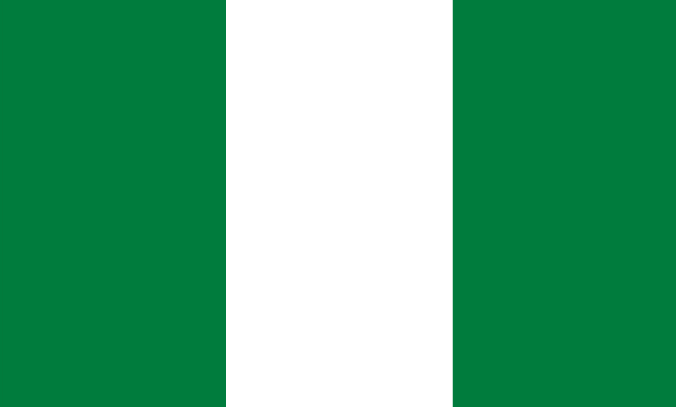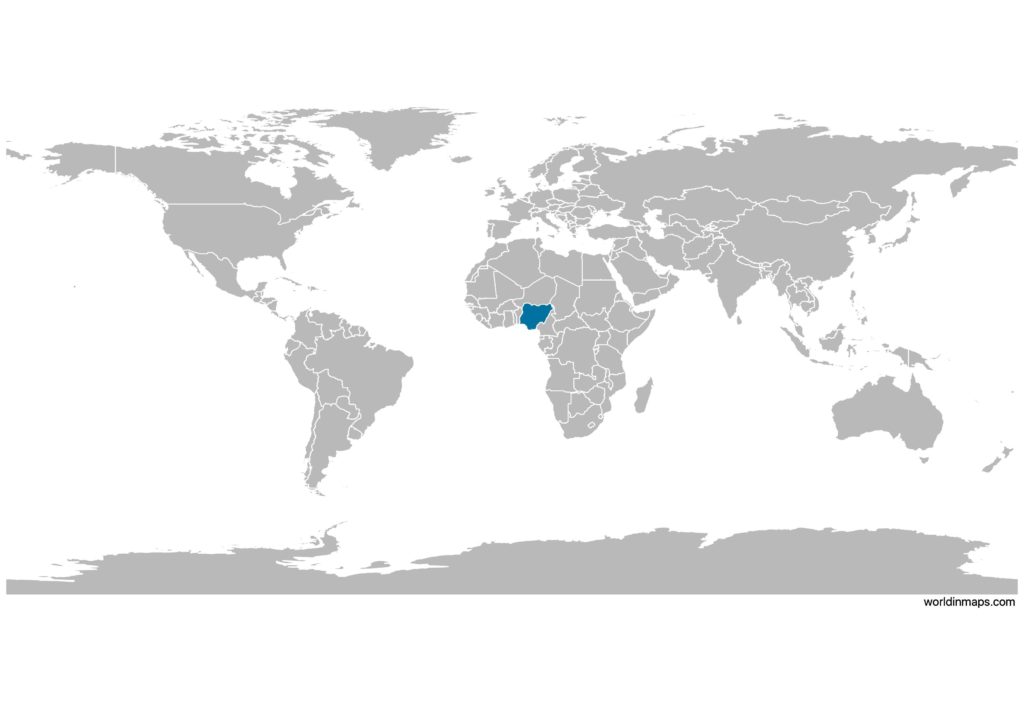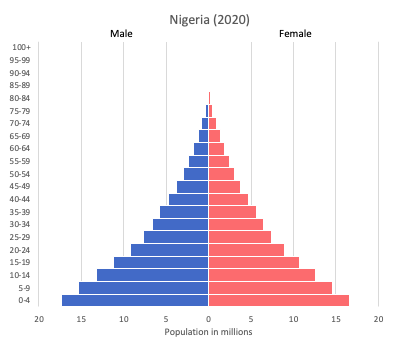Nigeria

| Government | |
| Name | Federal Republic of Nigeria |
| Hausa | Jamhuriyar Taraiyar Najeriya |
| Igbo | Ọ̀hàńjíkọ̀ Ọ̀hànézè Naìjíríyà |
| Yoruba | Orílẹ̀-èdè Olómìniira Àpapọ̀ Nàìjíríà |
| Government type | federal presidential republic |
| Capital | Abuja (776,298 (2006)) |
| Currency | Naira (NGN) |
| Organization | |
| Member State | Commonwealth of Nations |
| People | |
| Population (2020) | 206,139,587 (7th) |
| Density of population | 218 P/km2 (42nd) |
| Nationality | Nigerian |
| Official languages | |
| English | |
| Ethnic groups (2018) | |
| Hausa | 30% |
| Yoruba | 15.5% |
| Igbo (Ibo) | 15.2% |
| Fulani | 6% |
| Tiv | 2.4% |
| Kanuri / Beriberi | 2.4% |
| Ibibio | 1.8% |
| Ijaw / Izon | 1.8% |
| other | 24.7 |
| note: more than 250 ethnic groups in total | |
| Religions (2018) | |
| Muslim | 53.5% |
| Roman Catholic | 10.6% |
| other Christian | 35.3% |
| other | 0.6% |
| Life expectancy (2020) | |
| Male | 58.6 years |
| Female | 62.3 years |
| Total population | 60.4 years (217th) |
| Homicides | |
| Total (2016) | 34.5 per 100,000 people (10th) |
| Geography | |
| Land area | 910,768 km2 |
| water area | 13,000 km2 |
| total area | 923,768 km2 (33rd) |
| Mean elevation | 380 m |
| Lowest point | |
| Atlantic Ocean | 0 m |
| Highest point | |
| Chappal Waddi | 2,419 m |
| Land use (2011) | |
| Agricultural land | 78% |
| Arable land | 37.3% |
| Permanent crops | 7.4% |
| Permanent pasture | 33.3% |
| Forest | 9.5% |
| Other | 12.5% |
| Urbanization | |
| Urban population (2020) | 52% |
| Rate of urbanization | 4.23% annual rate of change (2015 – 2020) |
| Economy | |
| Labor force (2017) | 60.08 million (10th) |
| Labor force by occupation (1999) | |
| Agriculture | 70% |
| Industry | 10% |
| Services | 20% |
| Unemployment rate (2017) | 16.5% (178th) |
| GDP (PPP) (estimate 2020) | |
| Total | $1.275 trillion (23rd) |
| Per capita | $6,232 (129th) |
| GDP (nominal) (estimate 2020) | |
| Total | $504.57 billion (27th) |
| Per capita | $2,465 (137th) |
| GDP by sector (estimate 2016) | |
| Agriculture | 21.1% |
| Industry | 22.5% |
| Services | 56.4% |
| Exports (2017) | $1.146 billion (154th) |
| Exports partners (2017) | |
| India | 30.6% |
| US | 12.1% |
| Spain | 6.6% |
| China | 5.6% |
| France | 5.5% |
| Netherlands | 4.4% |
| Indonesia | 4.4 |
| Imports (2017) | $32.67 billion (62th) |
| Imports partners (2017) | |
| China | 21.1% |
| Belgium | 8.7% |
| US | 8.4% |
| South Korea | 7.5% |
| UK | 4.4% |
Nigeria on the world map

Nigeria top 10 largest cities (2006)
- Lagos (8,048,430)
- Kano (2,828,861)
- Ibadan (2,559,853)
- Benin City (1,147,188)
- Port Harcourt (1,005,904)
- Jos (821,618)
- Ilorin (777,667)
- Abuja (776,298)
- Kaduna (760,084)
- Enugu (722,664)
Demography
Population pyramid

Age structure data
Estimate for 2020:
- 0-14 years: 41.7% (male 45,571,738/female 43,674,769)
- 15-24 years: 20.27% (male 22,022,660/female 21,358,753)
- 25-54 years: 30.6% (male 32,808,913/female 32,686,474)
- 55-64 years: 4.13% (male 4,327,847/female 4,514,264)
- 65 years and over: 3.3% (male 3,329,083/female 3,733,801)
Remark: the age structure of a population affects a nation’s key socioeconomic issues. Countries with young populations (high percentage under age 15) need to invest more in schools, while countries with older populations (high percentage ages 65 and over) need to invest more in the health sector. The age structure can also be used to help predict potential political issues. For example, the rapid growth of a young adult population unable to find employment can lead to unrest.
Population from 1950 to 2020
Source: United Nations, Department of Economic and Social Affairs, Population Division (2019). World Population Prospects 2019, Online Edition. Rev. 1.
Evolution of the life expectancy from 1960 to 2018
Source: World Development Indicators, The World Bank
Major rivers
Economy
Agriculture:
cocoa, peanuts, cotton, palm oil, corn, rice, sorghum, millet, cassava (manioc, tapioca), yams, rubber; cattle, sheep, goats, pigs; timber; fish
Industries:
crude oil, coal, tin, columbite; rubber products, wood; hides and skins, textiles, cement and other construction materials, food products, footwear, chemicals, fertilizer, printing, ceramics, steel
Exports – commodities:
petroleum and petroleum products 95% (2012), cocoa, rubber
Imports – commodities:
machinery, chemicals, transport equipment, manufactured goods, food and live animals
Time zone and current time in Nigeria
Go to our interactive map to get the current time in Nigeria